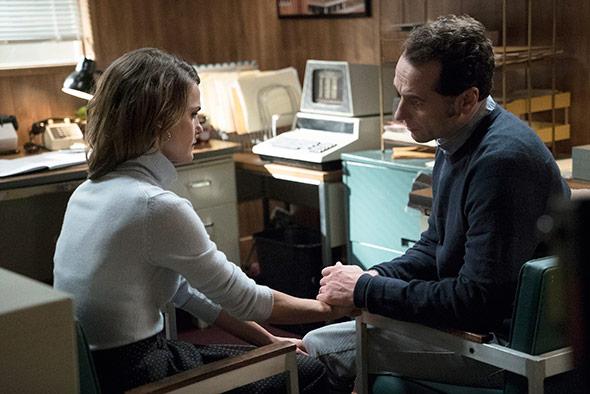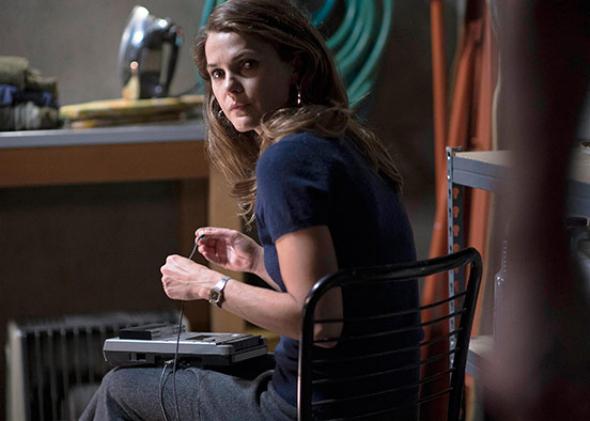The third season of FX’s great marital drama-cum-spy series The Americans begins with a scene sure to send a chill through the spines of doting, safety-conscious parents everywhere. Elizabeth Jennings (Keri Russell), deep-cover Soviet superspy, thinks back to teaching her daughter, Paige, how to swim. At the pool, surrounded by mothers patiently tending to children on kickboards and in floaties, Paige nervously cuddles up to her mother at the edge of the water, hesitant to get in. Elizabeth looks around, takes in the all the coddling, looks at her trusting child, and with no warning heaves her in. Sink or swim, kiddo, it’s the Soviet—or, wait, is it supposed to be the American?—way.
Philip (Matthew Rhys) and Elizabeth, the spies at the center of The Americans, are hell-bent on destroying America, yet so much of the frisson of The Americans emanates from their deep resemblance to everyday Americans.* They may be superspies caught up in the not-so-quotidian realities of espionage, but they are also a suburban couple who must contend with the bedrock banalities of maintaining a marriage and raising a family. There are principles, and then there is parenting, and it’s not easy to say which is the favorite in that particular fight.
As the new, darker season begins, Philip and Elizabeth are engaged in increasingly dangerous work to identify the American agents trying to undermine the USSR’s war in Afghanistan. (At the Russian Embassy, diplomats watch a video of a Russian soldier in Afghanistan being shot in the head by Mujahideen, a precursor to ISIS’s beheading videos.) At home the Jennings are engaged in an increasingly fraught cold war over 14-year-old Paige (Holly Taylor), as their Soviet overlords push to turn her into a “second-generation illegal,” i.e., a totally untraceable spy. Philip is against it. He thinks it’s too dangerous, that Paige should be left alone to be “free.” Elizabeth is for it. She sees Paige searching for meaning, specifically from a local church, and wants to give her some.

Photo by Michael Parmelee/FX
If this setup sounds like it should revolve around Paige, it doesn’t quite. The last two seasons of The Americans have been jump-started by Paige—what she knows, what her parents should know about her future—yet have used her largely as a foil to explore Elizabeth and Philip’s relationship. I’m not complaining. Taylor, the young actress who plays Paige, is extremely watchful. She emanates a stillness and secretiveness that jibe given her parents’ reticence and establish her as a certain type of guarded teen. Yet there is something that has never seemed quite right about Paige: Unlike her parents, she is not particularly charismatic, whatever the shows’ writers insist. Taylor, I think, has been slightly miscast. (And, yes! I do feel like a scrooge for saying this about an actress who can just barely go to R-rated films.) Still, the long arc of television has a way of making sense and meaning out of unintended performances. Philip and Elizabeth may not want to be typical American parents, but like most American parents, they believe that their child is special. Some American dreams are too powerful even for Communists to resist.
As is The Americans way, ideas and ideologies—Philip and Elizabeth’s soft- and tough-love approaches—start to ping-pong off each other, and contemporary mores, in satisfying ways. Philip wants to protect Paige, yet for work, he is soon sweet-talking an underage girl barely older than Paige, who simultaneously helps him connect with his daughter. Elizabeth, the more emotionally conservative of the two—unlike Philip, she’s not just devoted to Mother Russia, but disgusted by the general softness of America, the widespread ambition to live a comfortable life devoted to nothing at all—argues that Paige would be a good candidate for the Soviets because the church she is so involved with has all the “right kind” of anti-apartheid, anti-nuclear, lefty values. She’s the progressive who throws her kid into the deep end of the pool.
Philip and Elizabeth find themselves in the deep end as well. Their run-ins with the FBI are getting more and more dangerous, even if Stan Beeman (Noah Emmerich) is still a welcome guest at their house. (The Americans, ever alive to the most ridiculous of ’80s ephemera, has Stan attending EST classes; also look out for a blink-and-you’ll-miss-it Hershey’s Kiss commercial starring Jason Alexander when he was young and still had all his hair.) Elizabeth has to fight off two agents single-handedly. Elizabeth and Philip spend hours trying to elude a tail. Even when not dealing directly with the FBI, they have a seedy gloss to their spy antics, which are no longer just high-octane chases and bad wigs (the wigs have noticeably improved), but something danker and more disturbing, involving underage marks, inadvertent corpses, and abused women.
The Americans’ most memorable scenes rarely involve much talking. But whereas last year, some of those moments—a marital 69, for example—were strange and sexy, the new season’s equivalent are much more unsettling. The second episode contains a stomach-churning, nearly wordless—though not soundless—sequence that answers every question you didn’t want to know about how to fit a body in a suitcase. Through the first four episodes, the most loving exchange between Philip and Elizabeth comes as he pulls out one of her shattered back molars with no painkillers. Even when there is dialogue, it can be beside the point: Elizabeth makes small talk with her husband while completely naked, but he’s so angry he barely looks at her before rolling over and going to sleep. As Philip and Elizabeth fight about the kind of life their daughter should be living, their own lives are getting away from them.
Disclosure: The Americans was created by Joe Weisberg, brother of The Slate Group’s editor-in-chief, Jacob Weisberg.
Correction, Jan. 27, 2015: This article originally misstated that Philip and Elizabeth Jennings are double agents. They are just spies. (Return.)
